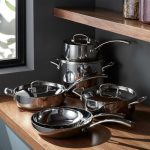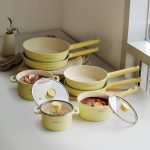In the realm of culinary tools, cookware plays an essential role in how safely and effectively we prepare our meals. Among the various options available, anodized cookware has gained attention for its unique safety features and health benefits. This article delves into these aspects, providing insights into why anodized cookware might be the right choice for your kitchen.
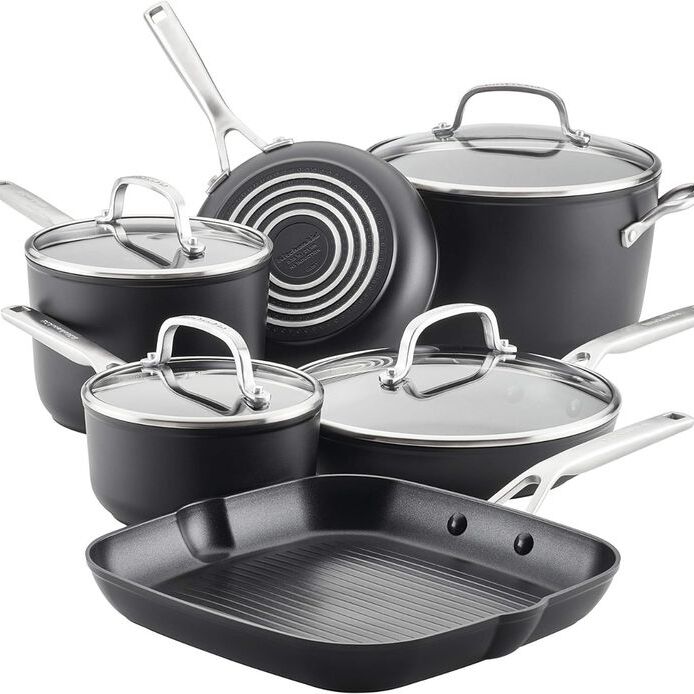
Understanding Anodized Cookware: What Sets It Apart
Anodized cookware typically starts with aluminum, which undergoes an electrochemical process known as anodization. This process forms a thick, protective layer of oxide on the surface of the aluminum. Unlike traditional aluminum cookware, which can react with acidic foods and potentially leach harmful substances, anodized aluminum cookware resists this interaction. This feature enhances safety, ensuring that your meals remain free of any unwanted chemical contamination.
Moreover, the anodization process significantly increases the cookware’s durability and scratch resistance. This quality is vital in a fast-paced kitchen where utensils rub against the surfaces. Many aluminum cookware options also feature a non-stick surface, providing added convenience without the worries associated with traditional non-stick coatings, which can degrade over time and release harmful chemicals. Knowing what sets cookware apart lays the foundation for understanding its safety benefits in the kitchen.
Safety First: The Non-Reactive Nature of Anodized Cookware
One of the foremost concerns in cooking involves the safety of the materials that come into contact with food. Anodized cookware stands out significantly due to its non-reactive properties. This quality becomes particularly important when preparing acidic dishes, such as tomato sauce or citrus-based recipes. Traditional aluminum cookware can lead to undesirable reactions when cooking such foods. These interactions may affect not only the flavor of your dish but can also result in the leaching of aluminum into your meals. This leaching raises health concerns about consuming aluminum.
In contrast, anodized cookware eliminates this concern. The anodized layer effectively prevents chemical reactions, allowing you to focus on your cooking without worry. You can confidently sauté, simmer, or braise without the fear of altering your food’s taste or composition. Anodized aluminum cookware provides a safe cooking surface that maintains the integrity of your ingredients.
Furthermore, this non-reactive feature makes anodized aluminum cookware suitable for a broader range of recipes. Its versatility enhances its appeal in the kitchen, making it a wise choice for cooks of all skill levels. Choosing anodized cookware means prioritizing both flavor and safety, creating a more enjoyable cooking experience overall. Your culinary adventures can thrive with the assurance that you’re using a reliable, safe product.

Addressing Health Concerns: The Safety of Chemical Coatings
Many consumers today are increasingly concerned about the safety of non-stick coatings used in traditional cookware. These coatings often consist of polytetrafluoroethylene (PTFE) or other fluorinated compounds. While they provide convenience in cooking, concerns arise when these materials degrade due to overheating. When overheated, they can release harmful fumes and toxins into the kitchen air. This poses a potential health risk, especially in poorly ventilated spaces.
In contrast, anodized cookware doesn’t rely on these chemical coatings to deliver a non-stick experience. Instead, it features a hard anodized surface that forms a protective layer over the aluminum. This surface provides natural non-stick properties, allowing food to release easily without the risks associated with synthetic materials. Cooks can enjoy the benefits of non-stick cooking without worrying about the release of harmful chemicals.
Moreover, anodized aluminum cookware is typically free from PFOA (perfluorooctanoic acid), a substance historically used in the production of many non-stick coatings. The absence of PFOA is a significant factor for health-conscious consumers looking for safer cooking options. Health risks linked to PFOA exposure, such as potential developmental issues and other health concerns, have led to increased scrutiny from researchers and regulatory agencies.
By opting for anodized cookware, you choose a safer alternative that is designed for everyday use without compromising your health. The benefits of using anodized aluminum cookware extend beyond convenience; they prioritize your well-being. You can prepare meals with confidence, knowing that your cookware does not contain harmful chemicals that could leach into your food. This commitment to health makes anodized cookware an excellent choice for any kitchen, providing peace of mind while you cook delicious meals for your family.
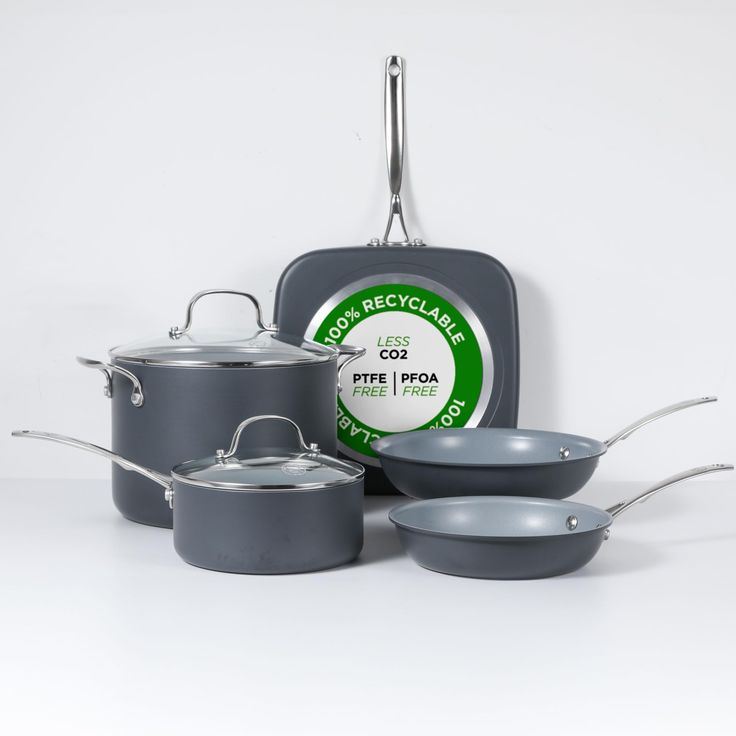
Cooking Performance: Healthier Cooking Methods
Beyond safety, anodized cookware offers impressive cooking performance. The anodized layer enhances heat distribution, preventing hot spots and ensuring even cooking. This feature is crucial for achieving perfectly cooked meals. When pans heat evenly, you reduce the likelihood of burning or undercooking food, directly impacting the nutritional value of your dishes.
Using anodized cookware also facilitates healthier cooking methods. For instance, you can sauté with minimal oil, leading to dishes lower in fat and calories while retaining essential nutrients. When paired with modern cooking technology, such as an efficient range hood, anodized aluminum cookware enhances the overall culinary experience. The range hood helps maintain good air quality in your kitchen by removing smoke and odors, creating a conducive cooking atmosphere.
Environmental Considerations: Sustainable Cookware Choices
As consumers become more environmentally conscious, cookware sustainability has gained attention. Many traditional cookware materials, particularly those with non-stick coatings, raise health and environmental concerns. In contrast, anodized cookware addresses these issues by offering a more sustainable option. The manufacturing process of anodized aluminum cookware generally produces less waste and emissions compared to creating synthetic coatings.
Additionally, because anodized aluminum cookware is highly durable, it has a longer lifespan than many other cookware types. This longevity contributes to a decrease in waste and less frequent replacement, reducing your overall environmental footprint. Using anodized cookware aligns with a sustainable cooking philosophy, allowing you to prioritize health and safety while caring for the planet.
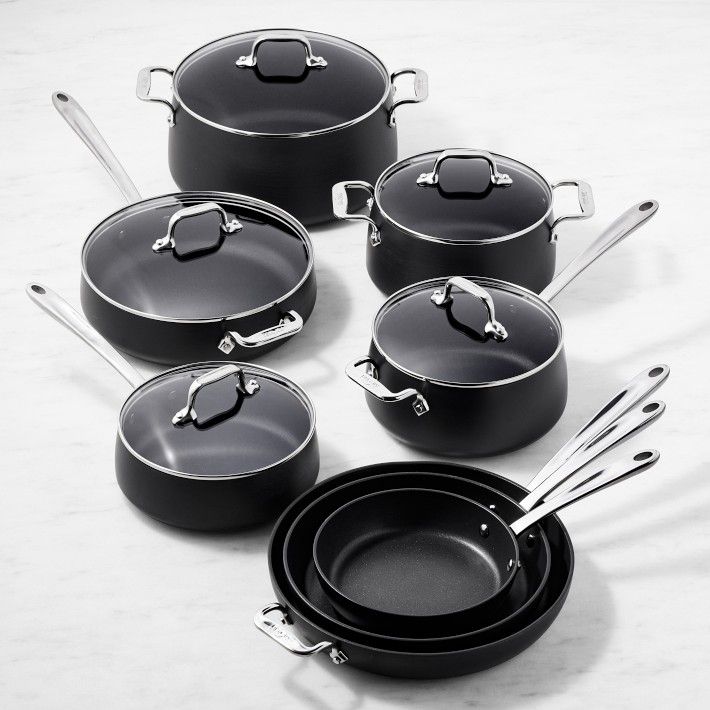
Ease of Maintenance: Keeping Cookware in Top Condition
Anodized cookware requires minimal maintenance compared to other types of cookware available on the market. Its hard surface is specifically designed to withstand everyday use while resisting scratches and dings. This durability makes anodized aluminum cookware an excellent investment. When you choose this option, you enjoy the simplicity of cleaning without sacrificing performance.
Most anodized aluminum cookware is also dishwasher safe, which greatly enhances convenience. After a long day of cooking, simply place your pans and pots in the dishwasher for effortless cleanup. However, regular cleaning with mild soap and a soft sponge works wonders for maintaining your cookware in excellent condition. This approach keeps your pots and pans looking polished while ensuring their non-stick properties remain intact.
While anodized cookware is relatively low-maintenance, you must avoid abrasive cleaners. Harsh chemicals or scouring pads can damage the anodized surface over time, leading to decreased performance and aesthetic appeal. Such damage can result in food sticking and an increased risk of scratches. Instead, opt for gentle cleansers that effectively remove grease and residues without harming the surface.
By adhering to maintenance best practices, you can preserve the integrity of your cookware for years to come. This preservation not only maximizes its safety but also enhances its functionality in your kitchen. With proper care, aluminum cookware can remain a reliable kitchen companion, ready to help you create delightful meals every day. Enjoy the ease of maintenance and the benefits it brings to your culinary adventures.
Investing in Quality: Choosing the Right Cookware
To fully experience the benefits of anodized cookware, investing in quality products is crucial. Look for reputable brands that prioritize safety and performance. High-quality aluminum cookware often features an aluminum core, enhancing heat conductivity and durability. When making a purchase, consider customer reviews and feedback to gauge the cookware’s effectiveness in real-world cooking scenarios.
Additionally, ensure the cookware you choose is compatible with your cooking methods. Many anodized options work well on various stovetops, including induction. If you use a range hood, consider how your cookware interacts with your cooking environment. A well-designed range hood can significantly improve kitchen safety by effectively ventilating smoke and cooking odors, making your overall cooking experience healthier and more enjoyable.
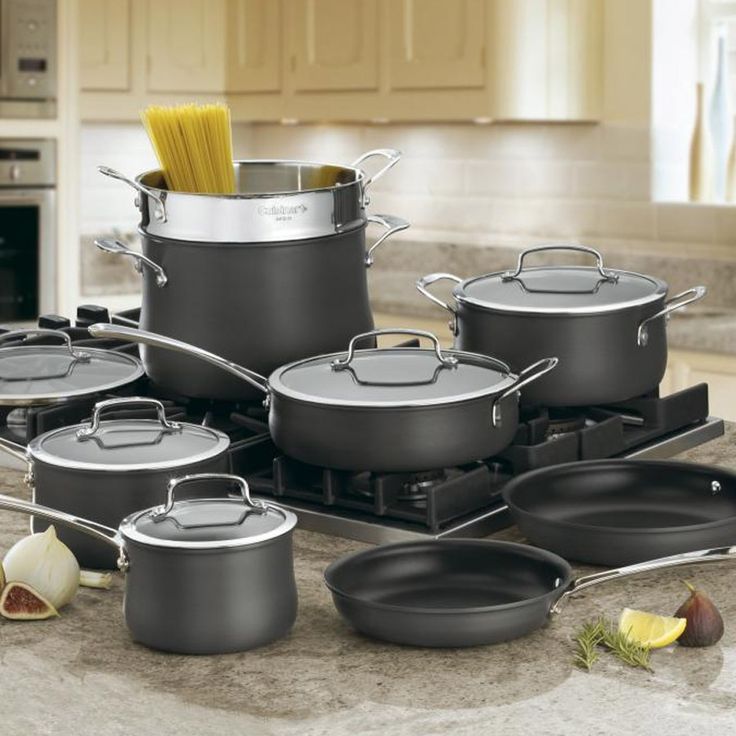
Conclusion: Prioritizing Safety and Health with Anodized Cookware
Choosing anodized cookware represents a commitment to safety and health in the kitchen. By understanding its non-reactive properties, ease of maintenance, and durability, you can make informed decisions that positively impact your cooking experience. Anodized cookware not only allows for healthier cooking methods but also aligns with sustainability goals.
Investing in high-quality anodized cookware ensures that you enjoy all these benefits while prioritizing the health of your family. Additionally, always consider the integration of tools like an efficient range hood to maintain a safe cooking environment. In today’s world, where health concerns matter more than ever, aluminum cookware stands out as a reliable and versatile option for chefs of all levels. Embrace this cookware, and unlock the potential for healthier, safer meals in your kitchen.
